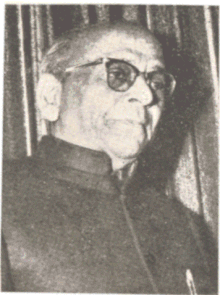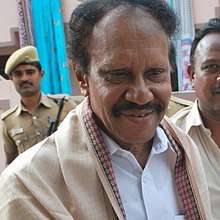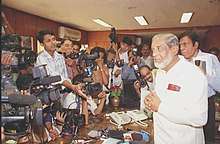Deputy Speaker of the Lok Sabha
The Deputy Speaker of the Lok Sabha is the vice-presiding officer of the Lok Sabha, the lower house of the Parliament of India. They act as the presiding officer in case of leave or absence caused by death or illness of the Speaker of the Lok Sabha. It is by convention that position of Deputy Speaker is offered to opposition party in India. .[1]
| Deputy Speaker of the Lok Sabha | |
|---|---|
 | |
 | |
Incumbent Vacant | |
| Style | The Honourable |
| Appointer | Members of the Lok Sabha |
| Term length | During the life of the Lok Sabha (five years maximum) |
| Inaugural holder | M. A. Ayyangar (1952–1956) |
| Formation | 30 May 1952 |
| Website | Official website |
 |
|---|
| This article is part of a series on the politics and government of India |
|
National coalitions
|
|
|
The Deputy Speaker is elected in the first meeting of the Lok Sabha after the General elections for a term of 5 years from amongst the members of the Lok Sabha. They hold office until either they cease to be a member of the Lok Sabha or they resign. They can be removed from office by a resolution passed in the Lok Sabha by an effective majority of its members.[2] In effective majority, the majority should be 50% or more than 50% of total strength of the house after removing the vacancies. Since the Deputy Speaker is accountable for the Lok Sabha, the elimination is done by the effective majority in Lok Sabha only. There is no need to resign from their original party though as a Deputy Speaker, they have to remain impartial.
Powers and functions of the Deputy Speaker
In case of the absence of the Speaker, the Deputy Speaker presides over the sessions of the Lok Sabha and conducts the business in the house. He decides whether a bill is a money bill or a non-money bill. They maintains discipline and decorum in the house and can punish a member for unruly behaviour by suspending him/her. They permit the moving of various kinds of motions and resolutions like the motion of no confidence, motion of adjournment, motion of censure and calling attention notice.
List of Deputy Speakers
References
- http://www.ndtv.com/article/india/jayalalithaa-s-partyman-thambidurai-is-unanimous-choice-for-deputy-speaker-574630
- Deogaonkar, S. G. (1997). Parliamentary System in India. New Delhi: Concept Publishing. pp. 48–9. ISBN 81-7022-651-1.
- "Members bioprofile on Lok Sabha website, AYYANGAR, SHRI M. ANANTHASAYANAM". National Informatics Centre, New Delhi and Lok Sabha. Archived from the original on 30 June 2013. Retrieved 10 May 2017.
- am first member of lok sabha lokprelist.aspx?lsno=1&tab=14 First Lok Sabha, 17/04/1952-04/04/1957
- Former Speakers - Sardar Hukam Singh
- Second Lok Sabha, 05/04/1957-31/03/1962
- "Members bioprofile on Lok Sabha website, RAO, SHRI S.V. KRISHNAMOORTHY". National Informatics Centre, New Delhi and Lok Sabha. Archived from the original on 26 July 2014. Retrieved 10 May 2017.
- Third Lok Sabha, 02/04/1962-03/03/1967
- Fourth Lok Sabha, 04/03/1967-27/12/1970
- Fifth Lok Sabha, 15/03/1971-18/01/1977
- Sixth Lok Sabha, 23/03/1977-22/08/1979
- Seventh Lok Sabha, 18/01/1980-31/12/1984
- Eighth Lok Sabha, 31/12/1984-27/11/1989
- Ninth Lok Sabha, 02/12/1989-13/03/1991
- Tenth Lok Sabha, 20/06/1991-10/05/1996
- Eleventh Lok Sabha, 20/06/1991-10/05/1996
- Twelfth Lok Sabha, 10/03/1998-26/04/1999
- Thirteenth Lok Sabha, 10/10/1999-06/02/2004
- Fourteenth Lok Sabha, 17/05/2004-18/05/2009
- Fifteenth Lok Sabha, 18/05/2009-18/05/2014
- "Sixteenth Lok Sabha 18/05/2014-25/05/2019".



_Bill%2C_2004%2C_in_New_Delhi_on_March_10%2C_2005.jpg)

.png)